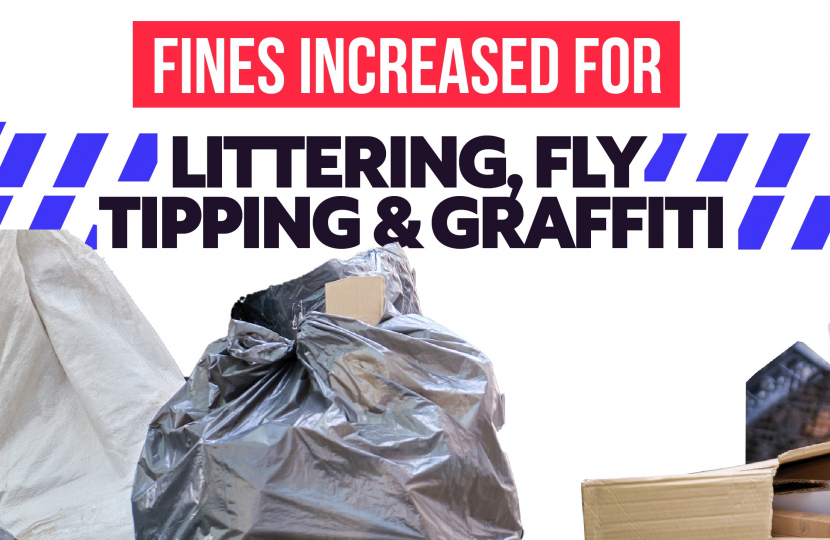
On-the spot fines for litter, graffiti and fly-tipping have increased from 31 July 2023 as part of a crackdown on anti-social behaviour.
A part of the Prime Minister’s Antisocial Behaviour Action Plan, launched in March, the upper limits for various fixed penalty notices (FPNs) is part of how the government will help councils to take tougher action against those who harm our public spaces. This means as of 31 July:
- The maximum amount those caught fly-tipping could be fined has increased from £400 to £1,000
- The maximum amount those who litter or graffiti could be fined has increased from £150 to £500
- The maximum amount those who breach their household waste duty of care could be fined has increased from £400 to £600
Commenting, Richard Fuller MP said:
I welcome the government's crackdown on fly-tipping as part of the Prime Minister's Anti-Social Behaviour Action Plan with new maximum fines now in place as of July 31st.
Too often as I drive around the beautiful countryside of North East Bedfordshire I see all manner of rubbish dumped at the roadside or in the gateways to farmers' fields. Not only is this an eyesore and a blight on the rural character of our environment, it is also a colossal waste of taxpayer money as significant costs are involved in clearing up the mess.
For too long the maximum fines imposed have represented little more than a slap on the wrist for those unscrupulous operators who make hefty incomes from fly-tipping. With maximum fines now standing at £1,000 from £400 previously, this will act as a major deterrent and hopefully make perpetrators think again.
It is also important that householders take responsibility for any 3rd party that they employ to dispose of their rubbish as ignorance of how the rubbish will be treated is no defence against prosecution if it is ultimately found to have been fly-tipped illegally.
In addition to increasing the upper limit on fines, the government launched a consultation with key stakeholders on ringfencing the receipts from FPNs for litter and fly-tipping to fund local authorities’ enforcement and clean-up activities, such as spending the money raised from fining criminals on further enforcement officers. This would see the money paid by criminals go directly back into repairing the damage from their crimes, or into enforcement efforts to prevent similar incidents from happening again.
The government wants councils to take a much tougher approach to this type of anti-social behaviour. Taking proportionate and effective enforcement action against people who intentionally or carelessly damage their environment is a practical step local authorities can take to change behaviour and deter others from offending.
The Code of Practice on Litter and Refuse, advises on best practice for litter enforcement from local authorities and makes clear that in no circumstances should enforcement activity be considered a means to raise revenue. New powers under the Environment Act 2021 will allow the government to ensure that enforcement powers are used with a high degree of professionalism, whether by council staff or private contractors, and to place this enforcement guidance on a firm statutory footing.
